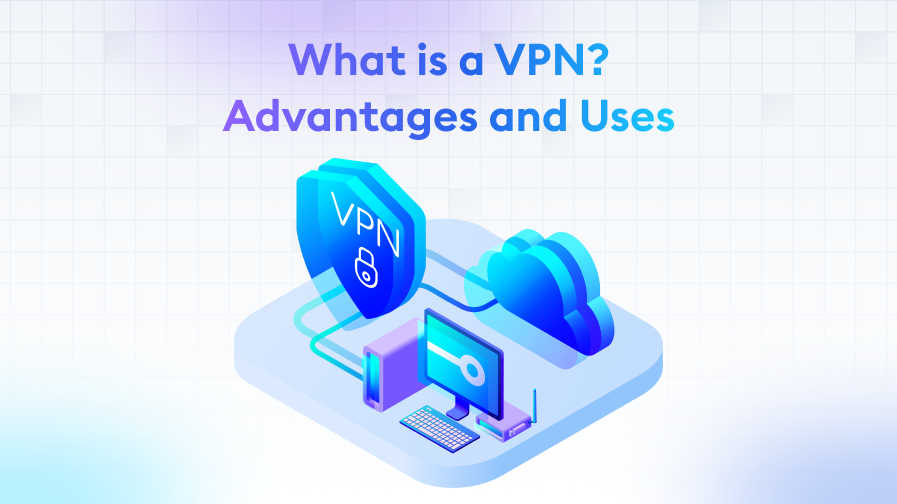Articles

What is a VPN? Advantages and Uses
Network & Security
22/09/2023 15:09
Serhat P.
5 min. reading
Introduction
When you first hear about a VPN (Virtual Private Network), you might wonder what it is and what it's used for. Put simply, a VPN is a technology that enhances your online privacy and security when you connect to the internet. VPNs create a private tunnel between you and the internet, shielding your connection and protecting you from online threats and prying eyes.
The reason VPNs have become so popular is not only because they provide online security and privacy, but also their ability to bypass geographic restrictions. This means that with a VPN, you can access any content from anywhere in the world.
Now, let's delve deeper into how a VPN works and how it's used.
What is a Virtual Private Network (VPN)?
A VPN is a type of network technology that preserves a user's online privacy and security when they connect to the internet. The VPN creates a private tunnel between you and the internet, keeping your data safe. This tunnel prevents your information from being stolen or monitored.
A VPN typically operates when you connect to the internet via a VPN server. This server routes all the data traffic between you and the internet, ensuring your data remains secure.
VPNs use encryption to protect your information. Encryption transforms your data from a readable format into an incomprehensible one. This keeps your data from being stolen or monitored.
The Role of Encryption in VPN
Encryption forms the foundation of VPN security. It's a security layer that guards your data as it travels from your computer to the VPN server. VPNs typically use high-level encryption to keep your data safe.
Encryption transforms your data into an unreadable format using an encryption algorithm. This algorithm encodes your data, and only someone with the correct key can decode it. This prevents your data from being stolen and keeps it secure.
The significance of encryption in a VPN is its ability to thwart data theft or monitoring. Encryption safeguards your information from prying eyes and malicious users.
The Importance of IP Hiding in VPN
A VPN also conceals your IP address. The IP address is a unique number assigned to your computer when you connect to the internet. Your IP address can be used to track your activities online, compromising your privacy.
By using a VPN, you can hide your IP address. The VPN uses the IP address of the server you're connected to, thereby hiding your real IP address.
Hiding your IP is essential for protecting your online privacy. By concealing your IP, you can prevent third-party trackers from knowing who you are and where you are located.
Bypassing Geographical Restrictions with VPN
A VPN can help you overcome geographical restrictions. Such restrictions allow access to specific content only from a particular country or region. A VPN can help you bypass these limitations.
A VPN allows you to connect to a server located in a specific country or region, giving the impression that you're accessing the internet from that location, which in turn helps you bypass geographic restrictions.
Bypassing these restrictions gives you more online freedom, meaning you can access any content from anywhere in the world.
VPN and Cybersecurity: A Closer Look
VPN is also crucial from a cybersecurity standpoint. A VPN can protect you from online threats. It creates a private tunnel between you and the internet, shielding you from online threats.
Additionally, a VPN provides protection against malware, viruses, and other cyber threats. It directs your internet traffic, preventing malware from reaching your computer.
The importance of VPN in cybersecurity is that it ensures your online safety. It helps protect against cyber threats and ensures your online safety.
VPN Use Cases and Advantages
VPNs have many use cases. Here are some of the most common ones:
- Privacy: VPNs protect your online privacy. They hide your IP address and prevent it from being used to track your online activities.
- Security: VPNs ensure your online safety. They encrypt your data and help protect against malware, viruses, and other cyber threats.
- Bypassing geographical restrictions: VPNs can help you overcome geographic limitations, allowing you to connect to a server located in a specific country or region.
Choosing the Right VPN Service
Choosing the right VPN service is vital. Although many VPN services offer similar features, some may be better than others. Here are some factors to consider when selecting a VPN service:
- Security: It's essential for a VPN service to be secure. The service should use high-level encryption to protect your data.
- Privacy: The service should protect your privacy. It should hide your IP address and not be used to track your online activities.
- Speed: It's important for the VPN service to be fast. It should direct your internet traffic quickly and not slow down your internet speed.
Conclusion: The Future of VPNs
VPNs are becoming increasingly crucial for online security and privacy. They protect against online threats and maintain your online privacy.
Additionally, VPNs can help you bypass geographical restrictions, granting access to content globally.
The future of VPNs looks bright. They are becoming increasingly vital for online security and privacy, and this trend is expected to continue.
If your security and freedom are essential to you, why not take action now? Discover the benefits a VPN can offer you and enjoy a more secure internet experience today! Give it a try!
